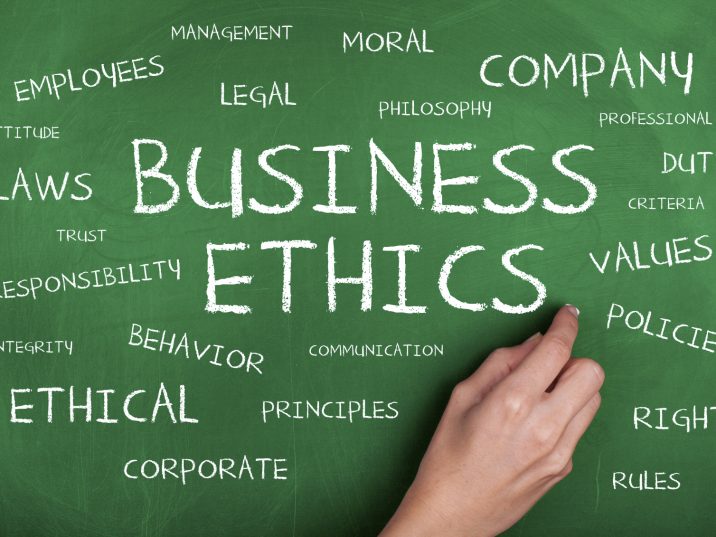Dean Richard Franza’s column appeared in the Sunday, Sept. 26, edition of the Augusta Chronicle. The post can be viewed here.
On Oct. 4, the Hull College of Business at Augusta University will play host to the latest installment of the Russell A. Blanchard Distinguished Lecture Series in Ethics. The lecture series is sponsored by an endowment provided by Georgia Bank & Trust (now part of South State Bank), given in memory of Mr. Blanchard.
Even though Mr. Blanchard – known endearingly to his friends and colleagues as “Mr. Russell” – passed away in 2007, his positive influence continues to resonate through this community and is memorialized in this lecture series. Those who knew him personally honor him in the way they emulate his ethical behavior, and we at the Hull College of Business attempt to honor “Mr. Russell” by imparting the importance of ethics in business throughout our curriculum.
In today’s column, I would like to honor Mr. Blanchard by reminding all of us the value of ethical behavior in business.
It is more than a coincidence that when I mention the name of Russell Blanchard around those who knew him, they invariably say, “He is the finest man I have ever known.” Mr. Blanchard was an extremely accomplished man. He was president of Georgia Railroad Bank & Trust Co.; founder and dean of the University of Georgia’s Georgia Banking School; and co-founder of Augusta Preparatory School.
However, he was best known for the kind of person he was, setting a great example for others, such that others around him tried to live up to that example. While Mr. Blanchard was extremely talented, it was his ethical behavior that set him apart. As business people and business leaders, we all need to follow Mr. Blanchard’s example.
As we try to emulate Mr. Blanchard, the first question we need to ask is “What are ethics?” Ethics are your sense of what is right or wrong. While the law provides us guidelines for appropriate behavior, ethics take us far beyond that. Ethics are composed of many principles, such as transparency; honesty; integrity; trustworthiness; fairness; concern and respect for others; commitment to excellence; and accountability. We certainly look for those principles as traits of leaders of our organization, and ethics are most definitely at the foundation of good business.
Ethics are critically important and impactful in many aspects of business. First and foremost, as noted above, a strong ethical foundation is essential for the top leadership and management of a firm. For a company to be well-managed and for its employees to be motivated, its leaders must behave ethically.
If a leader is transparent, honest, fair and respectful, the organization will run much more smoothly. Employees will be motivated to do what is best for the leader and for the organization if they know the organization deals with them in an ethical manner. Therefore, an organization led by ethical leaders and managers runs more effectively and efficiently, resulting in a higher-performing organization.
There are many other benefits to ethical behavior in business. An ethical organization led by ethical leaders will find it much easier to attract and retain talent. An organization that treats its people honestly, fairly and respectfully will be very desirable in this current environment in which the competition for talent is extremely intense.
When employees see you make ethical choices and act in an ethical manner, they will have confidence in you and confidence that the organization will treat them right. Now more than ever, the ability to attract and retain talent is at a premium and treating people ethically is often more attractive than many financial incentives.
Being an ethical leader and ethical company will also pay dividends throughout your value chain and supply chain. If you ethically treat your upstream supply chain partners (e.g., suppliers of raw materials and parts), you are more likely to get better treatment and better terms. In the current environment of supply chain delays, having good relationships with your partners will help minimize those delays.
Similarly, treating your downstream “partners” (e.g., retailers, end customers) ethically will make them more likely to use you as their preferred source. While others may offer lower prices, the fact that you treat your customers ethically will likely lead to repeat business.
Being ethical will likely make you feel better about yourself and allow you to sleep better at night. But, as you can see, there are a number of practical benefits to business from a strong ethical foundation: achieving better performance; attracting and retaining employees; and maintaining strong supplier and customer relationships. Emulating Mr. Blanchard is simply good business!
If you would like to attend this year’s lecture, it is free and open to the public. Our speaker is Denise Weiss of Deloitte, whose talk is titled, “The Ethical Case for Digital Empathy in User Experience,” a timely topic as we all spend more time in the digital arena. The lecture will be from 6 to 7 p.m. Oct. 4 at the Jaguar Student Activities Center Ballroom on the Summerville Campus of Augusta University.
As we remember Mr. Blanchard in anticipation of the lecture series, I would also like to bring to your attention the passing of another outstanding contributor to this community. On Sept. 4, one of my predecessors as dean of business at Augusta University, Dr. Otha L. Gray, passed away. Like Mr. Blanchard, Dr. Gray made a lasting positive impact on this community and without his efforts, the Hull College of Business would not be what it is today.







